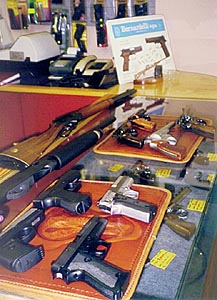![]()
|
|
|||||
|
SOWETO, South Africa — It's just before midnight on Friday in the casualty ward of Chris Hani Baragwanath Hospital, and Joseph Armaroesi, who has a bullet lodged in his foot, has been lying face down on a gurney for nearly an hour. He bears the intense pain with the stoicism of someone used to hard times and discomfort. "Guns should only be in the hands of police," says Armaroesi, 44, as he waits his turn behind a man with multiple stab wounds and before a man with a bullet in his shoulder. "There are too many unlicensed guns. They are robbed from whites in town and used against us." It's an argument that's hard to refute in the “surgical pit” of the world's largest public hospital, located on the edge of Soweto, one South Africa's most violent communities. The bare room is full of patients — some drunk, some unconscious, some with swollen bruises and open gashes — waiting on two battered wooden benches and in a line of red metal gurneys. Doctors and nurses — some of them foreigners who come here just to gain the rare training in trauma that Soweto provides — are much too busy to clean up the blood splattered on the concrete floor. On this night they will treat six gunshot victims and consider the number low; on a busy night, they treat twice or three times as many. Doctors here saw nearly 3,000 patients with gunshot wounds last year. The hospital is on the front lines of a national debate over what to do about the abundance of guns and gun violence in South Africa. In this country of striking economic and racial divisions, the murder and armed robbery rates have increased by more than 50 percent in the past decade. As many as 8 million firearms — half of them illegal — circulate in the country of 40 million people. Guns cause thirty deaths per day, according to police statistics, and an increasingly vocal group of gun control lobbyists is saying that the best way to lower the violent crime rates is to get rid of the guns. As the lobbyists push Parliament to pass stricter gun laws, the resulting controversy has revealed a deep core of fear about the future of post-Apartheid South Africa. Although white South Africans seem to fret the most loudly about violent crime, poor black neighborhoods like the one Armaroesi lives in have the highest murder and attempted murder rates. Armaroesi could have been one of those murder statistics, but he says, "God helped us not to run away." He was crossing the train tracks with a friend on his way home from work like every other day, when he heard a voice behind him say, “Old men, hands up.” When he turned, he saw four young men with a gun, who demanded his money. But Armaroesi refused to raise his hands or relinquish his money. The muggers shot him in the foot and ran away. They were scared by the sound of their own gunshot, he says. "It makes me feel bad," he says. "If I had the power, I would retaliate. But I don't know them." Armaroesi, a driver for a Johannesburg business, had never been shot before, and he says the armed robbery is a sign of the times in South Africa. |
|
||||


